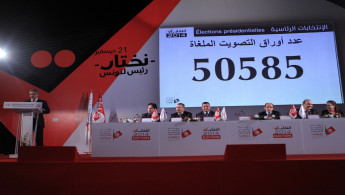Reposition, reinvent, rebrand: Tunisian politics in flux
Tunisian politics are never in a state of rest. This summer will be no different.
The next few months will witness the emergence of a new political player, the Citizen People Movement, founded by Moncef Marzouki, a former president. The left-wing Popular Front will also hold a general conference after restructuring and internal elections.
Ennahdha and Nidaa Tounes will hold their conferences, before or after the general conference of the Social Democratic Parties Coalition, which includes Mustapha bin Jafar's Ettakatol (the Democratic Forum for Labour and Liberties), Ahmed Naguib al-Shabi's Republican Party and Zouhair Maghzaoui's People's Movement, as well as other parties. Marzouki's former party, the Congress for the Republic, may also join the mobilisation in the coming days.
| Like Ennahdha, Nidaa Tounes is holding a conference that will determine its future direction. |
For some parties, the importance of these meetings lies in the details. Their agendas address major questions, which have been postponed for too long. For other parties, questions will be raised about their presence in Tunisia's political scene.
Ennahdha is introducing the essential question of "separating advocacy and political work" in its 10th conference. This means Ennahdha will be restructured, its political mission redefined, and the identity of those who are to carry out these changes decided.
Like Ennahdha, Nidaa Tounes is holding a conference that will determine its future direction and even, possibly, whether the party stays united. Preparing for this conference will be difficult, in the middle of radical differences among movements, and prominent figures within it pulling it in different directions, and serious debates about the leadership of the party.
The conference also raises an essential question about the successor of the party's founder Beji Caid Essebsi, the current president.
The Citizen People Movement
Marzouki is preparing to announce the official birth of the Citizen People Movement on 25 April, after the announcement was postponed due to the Bardo Museum attack in March.
Tunisia's political scene is anticipating the birth of the new political entity, curious about its nature, its possible future strength and size, following the huge popularity of Marzouki's presidential campaign, which was much more popular than that of his original party, the Congress for the Republic. Will Marzouki's new political party be able to capitalise on his popularity in the presidential elections?
Four parties withdrew from Marzouki's Citizen People Movement initiative, reportedly because of "continued uncertainty regarding its nature and political horizons".
In a joint statement issued almost a month ago, the Wafaa movement, the Reform and Development Party, the Justice and Development Party and the 17 December Development Front said "some parties to this dialogue are immature and continue to repeat their previous mistakes".
"Some parties who had been in charge of the initiative's initial coordination have attempted to push it in the direction of civil society, imposing this direction as a fait accompli in the conference, scheduled to be held on 20 March [before it was postponed due to the Bardo Museum attack]," the parties that withdrew said in a statement.
These parties had supported Marzouki in the last presidential elections, and subsequently his Citizen People Movement. They also participated in dialogues, trying to set up its organisational parameters.
| Four parties withdrew from Marzouki's Citizen People Movement initiative because of uncertainty about its direction. |
On Saturday, the regional committees of the Popular Front launched their activities, introducing new missions for its upcoming national symposium in May. The elections may lead to a new leadership structure and the reorganisation of the front's mission.
A group of political parties have been trying to unite under a new social democratic coalition recently. However, they have not succeeded yet, as there are too many ambitious and well-resourced personalities involved who are apparently not willing to compromise.
All these parties are trying to introduce themselves as a political alternative, a third option to Ennahdha and Nidaa Tounes. They are betting on the weakness of the two parties' political governing coalition, and their failure to address pressing economic and social challenges in Tunisia.
Many believe the governing coalition may be in danger of falling. Its powerful political base has started to erode as critical voices have attacked it from within, objecting to appointments and a lack of coordination and consultation.
This is an edited translation from our Arabic edition.





 Follow the Middle East's top stories in English at The New Arab on Google News
Follow the Middle East's top stories in English at The New Arab on Google News


